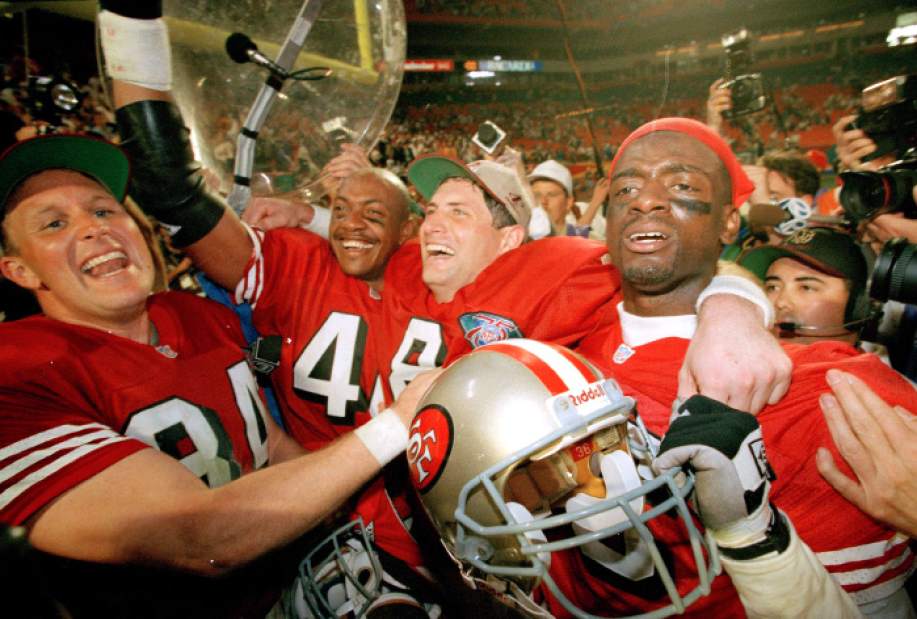Pittsburgh-area bookies remain confident despite possible legalization
Joe believed he had a sure thing.
The San Francisco 49ers were 18 1⁄2-point favorites over the San Diego Chargers in Super Bowl XXIX. The betting public was hot for the underdog.
Joe (not his real name), a bookmaker for the past 28 years who agreed to speak to Trib Total Media on the condition he be identified only as in his 40s and from Pittsburgh, was not yet 30 but knew the business. He had watched his great-uncle take bets for years. When Joe saw his clients betting the Chargers, he sensed a big payday.
“I took all that (Chargers money), and I bet everybody I knew Frisco,” he said.
When the 49ers won 49-26, Joe said he netted between $30,000 and $35,000 — the biggest score of his career — on the bets he took as a bookmaker and the ones he made as a gambler himself.
Twenty years later, Joe still is taking bets. Yet with experts believing sports gambling could be legalized nationwide in as soon as five years, he said he is confident his neighborhood business will remain vibrant.
“Who wants to go (to a sports book)?” he said. “You can just call (me) on the phone.
“You go to the casino and you might ... hit $5,000. (The IRS) wants to tax you on the $5,000. ... You don't pay any taxes on us.”
Joe even went so far to say sports betting should be legal.
“It's like betting the stock market,” he said. “It's the same thing. That's legal. This is illegal. It should be the reverse.”
Charlie (not his real name) also lives in Pittsburgh. Like Joe, he agreed to speak to the Trib about his bookmaking business on the condition of anonymity. About 15 years younger than Joe, he's been taking bets since only 2014, but he said he netted between $25,000 and $30,000 during his first year. So is he lucky or good?
“I think (bettors) are just bad,” said Charlie, who shares 70 clients with a partner. “While I'm successful in my (other) career, there is always money to be made.”
He said he also is not worried about possible legalization.
“Say they go to a casino and they put a bet in. They have to have cash in hand,” he said. “This is the total opposite. They get to go on the honor system. If they get smacked, there is always the option that they can go on some sort of payment plan.”
Joe and Charlie are relatively modest bookies — “There is one in every neighborhood, especially in the old Rust Belt,” Joe said — and they choose their clients carefully.
Joe used to have close to 70 clients. Now he is happy with 25 — still plenty, he said, to make it worth his time.
“I used to steal (my uncle's) number slips and hide them, and he'd be chasing me around the house,” Joe said, smiling at the memory.
Now the number slips are Joe's.
“If you're sitting by a lake and you see a lot of fish in the pond, you throw a hook in,” he said. “All the guys (in the neighborhood) were betting. ... I said, ‘I might as well get in on it.' ”
Discretion is vital on both ends.
One day, Joe said, he received a call from a client who started whispering.
“I said, ‘What's going on?' He said, ‘My wife's here. I'm in the closet. I can't talk too loud. What are the spreads?' ” Joe said.
Joe and Charlie work on the honor system, another advantage they said they would have over sports books. They seldom demand money up front.
Both get plenty of use from their phones, but Charlie sets up clients with a website based in Costa Rica where betting is legal, he said. The website takes bets on anything from the NFL to presidential elections. Joe takes bets mostly on college and pro football and college basketball.
Charlie uses the website to set minimum and maximum bets, and he even offers a payment plan for big losers.
For Joe: “If they owe, ‘I'll see you next week.' No big deal.”
Neither worries about the police.
“They are more worried about drugs,” Joe said. “That's what they should be worried about. (Betting) is still going to happen.”
Both operate mostly in cash.
“Tuesday we collect if they lose,” Charlie said. “Wednesday we pay them if they win.”
Charlie admits the job is “extremely stressful,” but he said, “I don't see why I would stop.
“I used to gamble myself and got destroyed. (His partner) knew how many people I could get. He said, ‘Why don't you just jump on my side?' ”
When Charlie first got into the business, stress kept him awake until he heard the nightly scores. Nowadays, he checks the results in the morning. “I'm not going to change the outcome,” he said.
Both have seen their share of sob stories, but Joe said he never has taken more than $2,000 off a bettor at one time.
“Everybody thinks they can handicap games,” Charlie said. “I had some guys jump on last year, and they went guns blazing. They ran out of bullets real quick.”
He said the smart bettors save their winnings.
“Give someone $3,000 when they win, and all of a sudden ... they don't have it (when they lose),” Charlie said. “He says, ‘I went out and bought furniture.' Well, you're an idiot. I want my money.
“Do I feel a little bit bad? Maybe. But at the end of the day, someone is getting his money. It may as well be me.”
Jerry DiPaola is a staff writer for Trib Total Media. Reach him at jdipaola@tribweb.com or via Twitter @JDiPaola_Trib.

